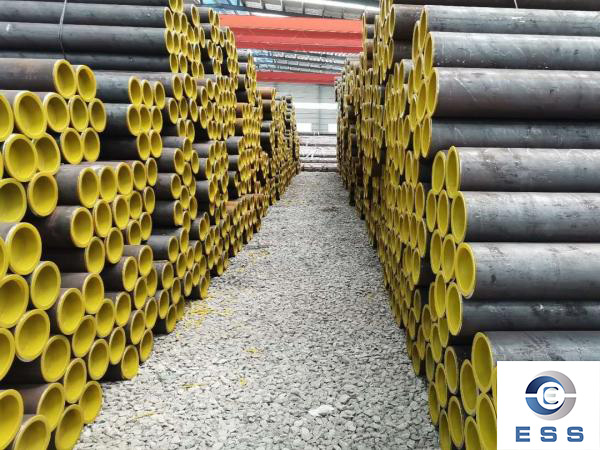Thermal expansion coefficient of
boiler tubes

The thermal expansion coefficient of boiler tubes refers to the ratio of the length change of boiler tubes per unit temperature change when the boiler tube expands due to heat.
Material characteristics of seamless boiler tubes
As a pipe for heat transfer and steam transmission, the material used for boiler tubes needs to have high temperature and high pressure, corrosion resistance, and oxidation resistance. Commonly used materials include carbon steel, alloy steel, stainless steel, etc.
Factors affecting the thermal expansion coefficient of boiler tubes
1. Material factors
The size of the thermal expansion coefficient of seamless steel pipes is related to the material. Generally speaking, the larger the thermal expansion coefficient of the material, the larger the thermal expansion coefficient of the seamless boiler steel pipe. The factors affecting the thermal expansion coefficient of materials mainly include lattice structure, interatomic distance, metal organization morphology, composition and other factors. The thermal expansion coefficients of different materials may vary greatly, so when selecting seamless boiler steel pipe materials, their thermal expansion properties need to be fully considered.
2. Temperature factors
Temperature is also an important factor affecting the thermal expansion coefficient of seamless boiler steel pipes. As the temperature increases, the thermal expansion coefficient of seamless boiler steel pipes will also increase accordingly. This is because the increase in temperature will intensify the thermal motion of the molecules inside the material, resulting in an increase in the distance between molecules, thereby changing the overall size of the seamless boiler steel pipe and the thermal expansion coefficient.
3. Bending degree factor
The thermal expansion coefficient of seamless boiler steel pipe is also related to its bending degree. Generally speaking, seamless boiler steel pipe will undergo a certain degree of deformation during the bending process, and this deformation will cause the thermal expansion coefficient to change. In actual engineering applications, it is necessary to select an appropriate bending radius according to the specific situation to avoid the failure of seamless boiler steel pipes due to excessive bending during use.
4. Wall thickness factor
The wall thickness of seamless boiler steel pipes will also affect their thermal expansion coefficient. Generally speaking, the thicker the wall thickness of seamless boiler steel pipes, the greater the thermal expansion coefficient. This is because the thicker the wall thickness of the seamless boiler steel pipe, the worse the thermal conductivity of its internal molecules, which leads to an increase in the thermal expansion coefficient.
The concept and calculation method of thermal expansion coefficient
The thermal expansion coefficient refers to the ratio of the length change of the material per unit temperature change when the temperature changes, usually expressed as α. For the thermal expansion coefficient of boiler tubes, it is necessary to consider the influence of pipe material and temperature change on the thermal expansion coefficient. The general calculation formula is:
ΔL = L0 × α × ΔT
Wherein, ΔL is the length change under temperature change; L0 is the initial length; α is the temperature coefficient; ΔT is the temperature change.
How to use thermal expansion coefficient for boiler tube design and installation
In the design and installation of boiler tubes, it is necessary to consider the possible changes in the pipes when they are heated and expand, and take corresponding compensation measures. The commonly used methods are:
1. Use expansion joints, elbows or guides for compensation;
2. Limit the expansion stroke of the pipeline, set fixed brackets and elastic supports, etc.;
3. Use highly elastic sealing elements for connection, such as metal bellows.
How to choose suitable boiler tube materials and thermal expansion coefficients
When selecting the material and thermal expansion coefficient of boiler tubes, it is necessary to consider the actual working conditions and requirements, such as temperature, pressure, medium, etc., select materials with good thermal elasticity and corrosion resistance, and calculate the appropriate thermal expansion coefficient according to the design requirements.
Conclusion
Through the introduction of this article, we understand the concept and calculation method of the thermal expansion coefficient of boiler tubes, and how to use the thermal expansion coefficient for the design and installation of boiler tubes. In actual engineering, it is necessary to comprehensively consider factors such as material characteristics, use conditions and calculation results, and select appropriate boiler tube materials and thermal expansion coefficients to ensure the normal operation and life of boiler tubes.
Read more: Features of boiler tube













 Eastern Steel Manufacturing Co.,Ltd not only improve product production and sales services, but also provide additional value-added services. As long as you need, we can complete your specific needs together.
Eastern Steel Manufacturing Co.,Ltd not only improve product production and sales services, but also provide additional value-added services. As long as you need, we can complete your specific needs together.










